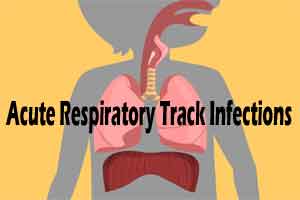- Home
- Editorial
- News
- Practice Guidelines
- Anesthesiology Guidelines
- Cancer Guidelines
- Cardiac Sciences Guidelines
- Critical Care Guidelines
- Dentistry Guidelines
- Dermatology Guidelines
- Diabetes and Endo Guidelines
- Diagnostics Guidelines
- ENT Guidelines
- Featured Practice Guidelines
- Gastroenterology Guidelines
- Geriatrics Guidelines
- Medicine Guidelines
- Nephrology Guidelines
- Neurosciences Guidelines
- Obs and Gynae Guidelines
- Ophthalmology Guidelines
- Orthopaedics Guidelines
- Paediatrics Guidelines
- Psychiatry Guidelines
- Pulmonology Guidelines
- Radiology Guidelines
- Surgery Guidelines
- Urology Guidelines
ACP Guidelines 2016 for Antibiotic Use in Acute Respiratory Track Infections

Acute respiratory tract infection (ARTI), which includes acute uncomplicated bronchitis, pharyngitis, rhinosinusitis, and the common cold, is the most common reason for acute outpatient physician office visits and antibiotic prescription in adults. Antibiotics are often inappropriately prescribed for patients with ARTI. In the past, WHO has repeatedly issued warning against the indiscriminate use of antibiotics especially in developing nation like ours. Even the Indian Medical Association in the month of January, 2016 came out with the advice asking the doctors of the nation to steer away from Inappropriate use of antibiotics for Acute Respiratory Tract Infections
American College of Physcians along with Centers for Disease Control and Prevention, came out with Guidelines presenting best practices for antibiotic use in healthy adults (those without chronic lung disease or immunocompromising conditions) presenting with ARTI. It was published on 15th March, 2016. This particular guideline serves as an update of the 2001 Principles of Appropriate Antibiotic Use for Treatment of Acute Respiratory Tract Infections in Adults and a complement to the pediatric principles published in 2013
The major recommendations of the guidelines are as follows:-
High-Value Care Advice 1: Clinicians should not perform testing or initiate antibiotic therapy in patients with bronchitis unless pneumonia is suspected.
High-Value Care Advice 2: Clinicians should test patients with symptoms suggestive of group A streptococcal pharyngitis (for example, persistent fevers, anterior cervical adenitis, and tonsillopharyngeal exudates or other appropriate combination of symptoms) by rapid antigen detection test and/or culture for group A Streptococcus. Clinicians should treat patients with antibiotics only if they have confirmed streptococcal pharyngitis.
High-Value Care Advice 3: Clinicians should reserve antibiotic treatment for acute rhinosinusitis for patients with persistent symptoms for more than 10 days, onset of severe symptoms or signs of high fever (>39 °C) and purulent nasal discharge or facial pain lasting for at least 3 consecutive days, or onset of worsening symptoms following a typical viral illness that lasted 5 days that was initially improving (double sickening).
High-Value Care Advice 4: Clinicians should not prescribe antibiotics for patients with the common cold.
To get the full guidelines, click on the following link:
http://annals.org/article.aspx?articleid=2481815
American College of Physcians along with Centers for Disease Control and Prevention, came out with Guidelines presenting best practices for antibiotic use in healthy adults (those without chronic lung disease or immunocompromising conditions) presenting with ARTI. It was published on 15th March, 2016. This particular guideline serves as an update of the 2001 Principles of Appropriate Antibiotic Use for Treatment of Acute Respiratory Tract Infections in Adults and a complement to the pediatric principles published in 2013
The major recommendations of the guidelines are as follows:-
High-Value Care Advice 1: Clinicians should not perform testing or initiate antibiotic therapy in patients with bronchitis unless pneumonia is suspected.
High-Value Care Advice 2: Clinicians should test patients with symptoms suggestive of group A streptococcal pharyngitis (for example, persistent fevers, anterior cervical adenitis, and tonsillopharyngeal exudates or other appropriate combination of symptoms) by rapid antigen detection test and/or culture for group A Streptococcus. Clinicians should treat patients with antibiotics only if they have confirmed streptococcal pharyngitis.
High-Value Care Advice 3: Clinicians should reserve antibiotic treatment for acute rhinosinusitis for patients with persistent symptoms for more than 10 days, onset of severe symptoms or signs of high fever (>39 °C) and purulent nasal discharge or facial pain lasting for at least 3 consecutive days, or onset of worsening symptoms following a typical viral illness that lasted 5 days that was initially improving (double sickening).
High-Value Care Advice 4: Clinicians should not prescribe antibiotics for patients with the common cold.
To get the full guidelines, click on the following link:
http://annals.org/article.aspx?articleid=2481815
Next Story
NO DATA FOUND

Disclaimer: This site is primarily intended for healthcare professionals. Any content/information on this website does not replace the advice of medical and/or health professionals and should not be construed as medical/diagnostic advice/endorsement or prescription. Use of this site is subject to our terms of use, privacy policy, advertisement policy. © 2020 Minerva Medical Treatment Pvt Ltd